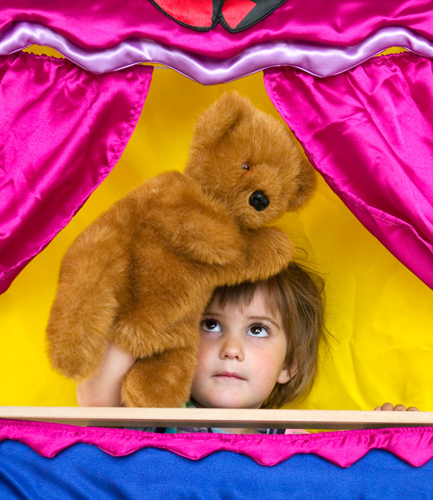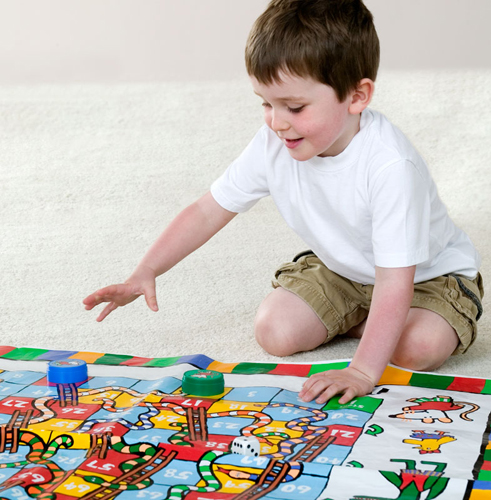Your toddler is much more independent now and enjoys
the company of other children. The transition from parallel play to
cooperative play is happening steadily, although she will still need
your help to manage her feelings when there is a disagreement with
another child.
“At this age, play is a wonderful time of make-believe and role-play. The boundaries between fantasy and reality are blurred.”
“As many as two out of
three children have one or more imaginary friends who ‘drop in’ from
time to time. They usually leave permanently by the time your child is
five or six.”
“All children need
opportunities to achieve and to feel good about themselves, so it is
okay to let your child win sometimes. Don’t make a habit of it, though,
since she will notice and feel cheated.”
“It has been amazing
to watch Oliver develop since starting preschool. He is less clingy,
more social, and increasingly confident.”
—“It has been
amazing to watch Oliver develop since starting preschool. He is less
clingy, more social, and increasingly confident.”
The biggest change you
will notice during the forthcoming year is the dominance of imagination
and make-believe in your toddler’s style of play. Her brain has now
developed to the stage where she has the ability to hold more than one
perspective or point of view in mind, which means that cooperative play
with other children (and with you) becomes far easier for her to
maintain. Her imagination is developing, as is her understanding and
exploration of the difference between fantasy and reality. “Symbolic” or
pretend play increases, too: she no longer needs a real car to make her
think she’s in a car or a real phone to play at telephones.
Three-year-olds have the ability to turn the most mundane items into
exciting possibilities for play.
There is no need to force
your child to see reality during this period. It is a magical time when
stories come alive; and cartoon characters, Santa Claus, fairies, and
other mythical characters really do exist in her mind. Let her fantasies
continue where they are enjoyable, but be aware that it can be hard for
a toddler to know what is real. Sometimes she will become so engrossed
in what she is doing or watching that the lines between fantasy and
reality blur. She may find it hard to distinguish between them because
she finds it hard to hold more than one view in her mind at a time. For
example, if someone is dressed up as a lion, she may think it is
is a lion. Your toddler has begun to realize that not everyone sees the
world the same way that she does. She has started to be able to see the
world from another person’s perspective, but has difficulty holding
both perspectives in her mind at the same time and so may shift between
the two. What something looks like is what it is.
As well as imagining
positive fantasy characters, your child will also be able to imagine
frightening images. The difficulty with living with an active
imagination is that it can lead to fearfulness. This is why it is vital
that you supervise her television viewing and try to limit exposure to inappropriate or disturbing images.
Your toddler may enjoy
being slightly scared by mild surprises when playing “Boo” or reading
books about monsters, but some televised cartoons, movie animations, and
special effects can be very scary. Even a movie designated as suitable
for a seven-year-old can be totally inappropriate for your preschooler.
Imaginary friends
Children find different
ways to deal with, or show, their fears and anxieties, one of which is
through the invention of an imaginary friend. This is nothing to be
concerned about. The age of 3–4 is the time when imaginary friends may
typically become a part of your child’s life. They may sometimes be an
indicator of a child feeling anxious and seeking comfort, but this is by
no means always the case.
An imaginary friend
has many advantages. He, she, or it, is always there to play with and
is always cooperative. An imaginary friend will absorb your child’s
blame or anger as well as any destructive feelings your toddler may have
because she can talk to her imaginary friend and stay in control. In
times of fear, her imaginary friend can keep her safe from monsters,
shadow faces on the walls, unexplained noises, and fears about new
experiences such as going to the doctor. This is a healthy part of
development so do not worry or try to stop the companionship. Equally,
the friend can be a playmate or companion in adventure. Your child’s
imaginary friend will leave when your child doesn’t need her any more.
One word of caution:
imaginary friends can also be used as master negotiators! No matter how
charming it may seem, resist the temptation to play along if your child
uses her imaginary friend to try to dictate routine or avoid the
consequences of unacceptable behavior. On the other hand, appreciation
of her imaginary friend when he or she is pleasant (for example, helping
to set the table or kissing you goodnight) will do no harm and may help
your toddler deal with learning to do new things. Imaginary friends
should not become a substitute for real friends, however. It is
important that your toddler has plenty of opportunities to mix with and
get used to her nonimaginary peers.
Top tips for understanding imaginary friends:
Accept that having imaginary friends is a natural part of childhood and accept them if they make an appearance.
Don’t
be dismissive or critical, or deny the friend exists. This phase of
imagination won’t last forever. Let your child enjoy it while she can.
Don’t be tempted to direct or “adopt” the imaginary friend yourself—let your toddler take the lead.
If your toddler seems to be using the imaginary friend to deal with negative feelings, encourage her to talk to you instead.
Listen
to how your child talks to her friend and watch how she plays with her.
The relationship may give you a lot of insight into your child’s
thoughts and feelings.
Imaginative play
Children get great enjoyment from creating and playing out
imaginary scenes from everyday life, as well as building on scenes they
have seen in movies, cartoons, or picture books.

New “Friends”
Listen when she tells you about her imaginary friends—don’t
dismiss them. But, equally, don’t allow her to use them to encourage you
to give her what she wants.

Lying and cheating
Small lies are a natural part of mental development and show that thinking and reasoning skills are maturing. This doesn’t
mean that a lie should go unchallenged, but you shouldn’t worry that it
is an indicator that your child will make it a habit. Figuring out the
rules of the world and recognizing moral boundaries are skills we apply
throughout life. As your child gets older, she will remember the
boundaries you have taught her and make judgements that take your stance
into account.
The important factor at
this age is not the lie itself, but the reason for the lie. Bear in mind
that your child is eager to “get things right” and to impress and
please you, and so may lie to avoid the consequences of your
displeasure. Go over the incident and explain to your child why she
should not lie. Children are still very egocentric at this age and so
may not relate to your feelings of being upset; so your explanation
needs to be clear and simple. She will learn over time, with some
repetition on your part. Also praise truth-telling and be honest with
yourself about your own traits. If your child notices you aren’t
truthful, she may follow your lead.
Cheating at games
Age 3–4 is the time
when children first encounter the urge to cheat in games. This is
similar to lying, in that they know they will get praise and attention
if they win. However, it is an interesting developmental milestone as
well, in that a child cannot cheat unless she understands what is going
to happen in a game. It shows her reasoning skills and intelligence are
developing. She has learned that the act of winning makes her feel good;
it builds her self-esteem.
A toddler who is losing a
game has several options to vent her frustration: she can end the game
by destroying it; she can try to change the rules to suit her needs; or
she can cheat. Your child is now old enough to understand a basic
explanation of why she should not cheat. Start by explaining why rules
are important; explain why fairness is important; and explain that rules
apply to everyone (even Mommy and Daddy). If she keeps forgetting what
the rules are, have the patience to remind her regularly.
If your child or
another toddler destroys the game and ruins the fun for other people,
explain why it is unacceptable to behave that way. If necessary, use “time out” techniques
to help your child calm herself down and put some distance between her
mood and her actions. The consequence of losing out on the fun of the
game should help her learn that her actions do not reap rewards and
hence make such behavior less likely in the future.
However, although the
recalcitrant toddler should be no longer allowed to play the game,
continue it with the other children, if possible, so that they do not
lose out on the satisfaction of being cooperative and remaining part of
the game.
Playing by the rules
It can be tempting to let your child cheat, but try not to since
he needs to learn to tolerate the sense of frustration that losing
causes.
